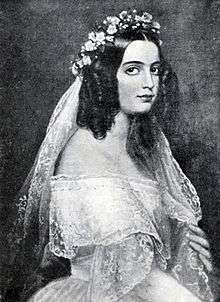Isabel Maria de Alcântara, Duchess of Goiás
| Isabel Maria | |||||
|---|---|---|---|---|---|
|
Duchess of Goiás Countess of Treuberg Baroness of Holsen | |||||
 Duchess of Goiás in 1843 | |||||
| Born |
23 May 1824 Rio de Janeiro, Empire of Brazil | ||||
| Died |
3 November 1898 (aged 74) Murnau am Staffelsee, Kingdom of Bavaria | ||||
| Spouse | Ernst von Treuberg, Count of Treuberg | ||||
| Issue |
Maria Amélia Fernando Augusta Francisco | ||||
| |||||
| Father | Pedro I of Brazil | ||||
| Mother | Domitila de Castro, Marchioness of Santos | ||||
Isabel Maria de Alcântara, Duchess of Goiás (3 May 1824 – 23 November 1898), was a Brazilian noble, the illegitimate daughter of Emperor Pedro I of Brazil and Domitila de Castro, Marchioness of Santos.
She was the only child of Pedro I born out of wedlock who was officially legitimized by him.[1] On 24 May 1826, Isabel Maria was given the title of "Duchess of Goiás", the style of Highness and the right to use the honorific "Dona" (Lady).[1] She was the first person to hold the rank of duke in the Empire of Brazil.[2] These honors did not confer on her the status of Brazilian princess or place her in the line of succession. In his will, Pedro I gave her a share of his estate.[3] She later lost her Brazilian title and honors upon her 17 April 1843 marriage to a foreigner, Ernst Fischler von Treuberg, Count of Treuberg.[4][5]
Pedro I wished for Isabel to be treated as a Princess of Brazil at the same level with his legitimate daughters. He accorded her equivalent official honors, such as having her greeted by the Imperial guard and in naming her protector of the province of Goias. He unsuccessfully tried to have her raised among his legitimate children in the Palace of São Cristóvão, but both his first, and later his second empress, refused. From 1829, she was educated at the Ecole du Sacré-Coeur in Paris. When her father abdicated the Brazilian throne and came to Paris, she was accepted by her stepmother, Empress Amelia, and spent time with them in Paris as a family. When the family left for Portugal, however, she remained. After the death of her father in 1834, she was sent to Münich by her stepmother to be educated in the care of Antônio Teles da Silva Caminha e Meneses. Her marriage was arranged by her stepmother: her spouse had an office at the royal court in Münich.
References
- 1 2 Sousa 1972, Vol 2, p. 229.
- ↑ Viana 1968, p. 204.
- ↑ Rangel 1928, p. 447.
- ↑ Rodrigues 1975, Vol 4, p. 22.
- ↑ Lira 1977, Vol 1, p. 276.
Bibliography
- Lira, Heitor (1977). História de Dom Pedro II (1825–1891): Ascenção (1825–1870) (in Portuguese). 1. Belo Horizonte: Itatiaia.
- Rangel, Alberto (1928). Dom Pedro Primeiro e a Marquesa de Santos (in Portuguese) (2 ed.). Tours, Indre-et-Loire: Arrault.
- Rodrigues, José Honório (1975). Independência: revolução e contra-revolução (in Portuguese). 4. Rio de Janeiro: Livraria Francisco Alves Editora.
- Sousa, Otávio Tarquínio de (1972). A vida de D. Pedro I (in Portuguese). 2. Rio de Janeiro: José Olímpio.
- Viana, Hélio (1968). Vultos do Império (in Portuguese). São Paulo: Companhia Editora Nacional.
| Ancestors of Isabel Maria de Alcântara, Duchess of Goiás | ||||||||||||||||||||||||||||||||||||||||||||||||||||||||||||||||||||||||||||||||||||||||||||||||||||||||||||||||||||||||||||||||||||||||||||||||||||||||||||||||||||||||||||||||||||||||||||||||||||||||||||||||||||||||||||||||||||||||||||||||||||||||||||||||||||||||||||||||||||||||||||||||||||||||||||||||||||||||||||||||||||||||||||||||||||||||||||||||||||||||||||||||||||||||||||||||||||||||||||||||||||||||||||||||||||||||||||||||||||||||||||||||||||||||||||||||||||||||||||||||||||||||||||||||||||||||||||||||||
|---|---|---|---|---|---|---|---|---|---|---|---|---|---|---|---|---|---|---|---|---|---|---|---|---|---|---|---|---|---|---|---|---|---|---|---|---|---|---|---|---|---|---|---|---|---|---|---|---|---|---|---|---|---|---|---|---|---|---|---|---|---|---|---|---|---|---|---|---|---|---|---|---|---|---|---|---|---|---|---|---|---|---|---|---|---|---|---|---|---|---|---|---|---|---|---|---|---|---|---|---|---|---|---|---|---|---|---|---|---|---|---|---|---|---|---|---|---|---|---|---|---|---|---|---|---|---|---|---|---|---|---|---|---|---|---|---|---|---|---|---|---|---|---|---|---|---|---|---|---|---|---|---|---|---|---|---|---|---|---|---|---|---|---|---|---|---|---|---|---|---|---|---|---|---|---|---|---|---|---|---|---|---|---|---|---|---|---|---|---|---|---|---|---|---|---|---|---|---|---|---|---|---|---|---|---|---|---|---|---|---|---|---|---|---|---|---|---|---|---|---|---|---|---|---|---|---|---|---|---|---|---|---|---|---|---|---|---|---|---|---|---|---|---|---|---|---|---|---|---|---|---|---|---|---|---|---|---|---|---|---|---|---|---|---|---|---|---|---|---|---|---|---|---|---|---|---|---|---|---|---|---|---|---|---|---|---|---|---|---|---|---|---|---|---|---|---|---|---|---|---|---|---|---|---|---|---|---|---|---|---|---|---|---|---|---|---|---|---|---|---|---|---|---|---|---|---|---|---|---|---|---|---|---|---|---|---|---|---|---|---|---|---|---|---|---|---|---|---|---|---|---|---|---|---|---|---|---|---|---|---|---|---|---|---|---|---|---|---|---|---|---|---|---|---|---|---|---|---|---|---|---|---|---|---|---|---|---|---|---|---|---|---|---|---|---|---|---|---|---|---|---|---|---|---|---|---|---|---|---|---|---|---|---|---|---|---|---|---|---|---|---|---|---|---|---|---|---|---|---|---|---|---|---|---|---|---|---|---|---|---|---|---|---|---|---|---|---|---|---|---|---|---|---|---|---|---|---|---|---|---|---|---|---|---|---|---|---|---|---|---|---|---|---|---|---|---|---|---|---|---|---|---|---|---|---|---|---|---|---|---|---|---|---|---|---|---|---|---|---|---|---|---|---|---|---|---|---|---|---|---|---|---|---|---|
| ||||||||||||||||||||||||||||||||||||||||||||||||||||||||||||||||||||||||||||||||||||||||||||||||||||||||||||||||||||||||||||||||||||||||||||||||||||||||||||||||||||||||||||||||||||||||||||||||||||||||||||||||||||||||||||||||||||||||||||||||||||||||||||||||||||||||||||||||||||||||||||||||||||||||||||||||||||||||||||||||||||||||||||||||||||||||||||||||||||||||||||||||||||||||||||||||||||||||||||||||||||||||||||||||||||||||||||||||||||||||||||||||||||||||||||||||||||||||||||||||||||||||||||||||||||||||||||||||||